The Allahabad high court on Thursday allowed the Archaeological Survey of India (ASI) to conduct a scientific survey at the Gyanvapi premises in Varanasi to determine whether the 17th-century mosque has been constructed over a pre-existing structure of a Hindu temple.

Hours after the high court upheld a district court order and ruled that the proposed survey is "necessary in the interest of justice" and will benefit both sides, the Anjuman Intezamia Masjid committee moved the Supreme Court against the judgment. The mosque stands next to the Kashi Vishwanath temple.
Varanasi district magistrate S Rajalingam said the ASI has sought assistance from the local administration to start the survey from Friday. He said detailed discussions were held with the Varanasi police commissioner on security during the survey and that the district administration is fully prepared to start the work.
Dismissing the petition by the Muslim body, which manages the affairs of the Gyanvapi mosque, challenging a district court order that had permitted the ASI survey, the bench of Chief Justice Pritinker Diwaker held that the order is just and proper, and no interference from the high court is warranted.
There is no reason to not believe the ASI's assurance that the survey will not cause any damage to the structure, it said, asserting that no digging should be done on the mosque premises.
”In the opinion of the court, the scientific survey/investigation proposed is necessary in the interest of justice and shall benefit the plaintiffs and defendants alike and come in aid of the trial court to arrive at a just decision. The (trial) court was justified in passing the impugned order,” the bench said in its 16-page verdict.
According to advocate Vishnu Shankar Jain, who represented the Hindu side, the high court has stated that the district court's order on the ASI survey will be effective immediately.
Bharatiya Janata Party leaders welcomed the high court verdict, saying the "truth" about the temple at the site will now come out.
"It is a good verdict. For us Indians, it is one that gives hope. Truth always comes out, it takes time but the truth comes out," BJP MP Pragya Singh Thakur told reporters outside Parliament.
But Bahujan Samaj Party MP from Amroha Danish Ali said the Places of Worship Act, 1991, should be implemented in toto. The Act prohibits conversion of any place of worship and provides for the maintenance of its religious character as it existed on August 15, 1947.
"Otherwise this will keep happening, people will look for a temple in a mosque and someone will look for a monastery in a temple," he said.
In the Supreme Court, advocate Nizam Pasha mentioned the matter before Chief Justice D Y Chandrachud seeking an urgent hearing. The CJI was heading a five-judge Constitution bench hearing arguments on challenge to the abrogation of Article 370 and was rising for the day.
"The Allahabad high court has passed an order today. We have filed an SLP against the order. I have sent an email (seeking urgent hearing). Let them not proceed with the survey...," Pasha said.
"I will look at the email right away," the CJI responded.
One of the parties from the Hindu side has also filed a caveat in the apex court saying no orders be passed without hearing them in the matter.
Ruling that any interim order stands vacated and that the Varanasi district judge's July 21, 2023 order is restored, the high court observed that in this advanced stage of time, many new things have been developed and now with the help of new technology and able guidance of responsible officers of ASI, the scientific investigation can be made.
"I find no substance in the argument that without digging any wall, things cannot be finalised by the ASI. The officer present in the court together with the learned additional solicitor general of India has made submission in the form of an affidavit that no excavation whatsoever will take place."
"Further, there is no substance in the argument made by the applicant/defendant no.4 (Muslim side) that the applications filed by the plaintiffs, seeking scientific investigation of the structure in question are not tenable in the eyes of law just because the issues have not been framed as yet. The scientific investigation has nothing to do with the other evidence and whatever evidence would be collected, that may be for all the parties and not only for the plaintiffs".
The high court further observed that as the proceedings of the suit have been lingering on for long, it would be appropriate to observe that the court concerned shall make all endeavours to conclude the proceedings expeditiously, without granting unnecessary adjournments to either of the parties by giving short dates.
It ordered the ASI director to conduct a detailed scientific investigation by using GPR survey, excavation, dating method and other modern techniques of the present structure to find out as to whether same has been constructed over a pre-existing structure of Hindu temple.
The court also said that the ASI director is ordered to conduct ground penetrating radar (GPR) survey just below the three domes of the building in question and conduct excavation, if required.
The Varanasi district court had directed the ASI to conduct a "detailed scientific survey" -- including excavations, wherever necessary -- to determine if the Gyanvapi mosque is built upon a temple.
The Anjuman Intezamia Masjid committee moved the high court on July 25, a day after the Supreme Court halted the ASI survey till 5 pm on July 26, allowing time for the committee to appeal against the lower court's order.
Chief Justice Diwaker had reserved the order on the mosque committee's petition on July 27 after hearing arguments from both sides. The court had also stayed the ASI survey till Thursday.
The mosque wazukhana, where a structure claimed by Hindu litigants to be a Shivling exists, will not be part of the survey -- following an earlier Supreme Court order protecting that spot in the Gyanvapi complex.
Hindu activists claim that a temple existed earlier at the site and was demolished in the 17th century on the order of Mughal emperor Aurangzeb.


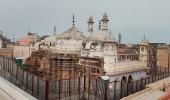
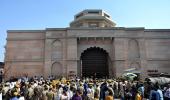
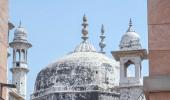



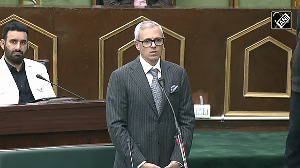
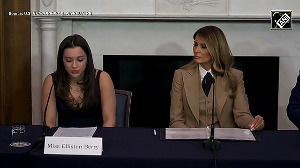
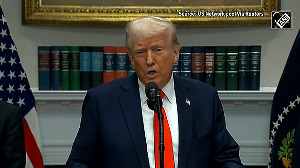
 © 2025
© 2025